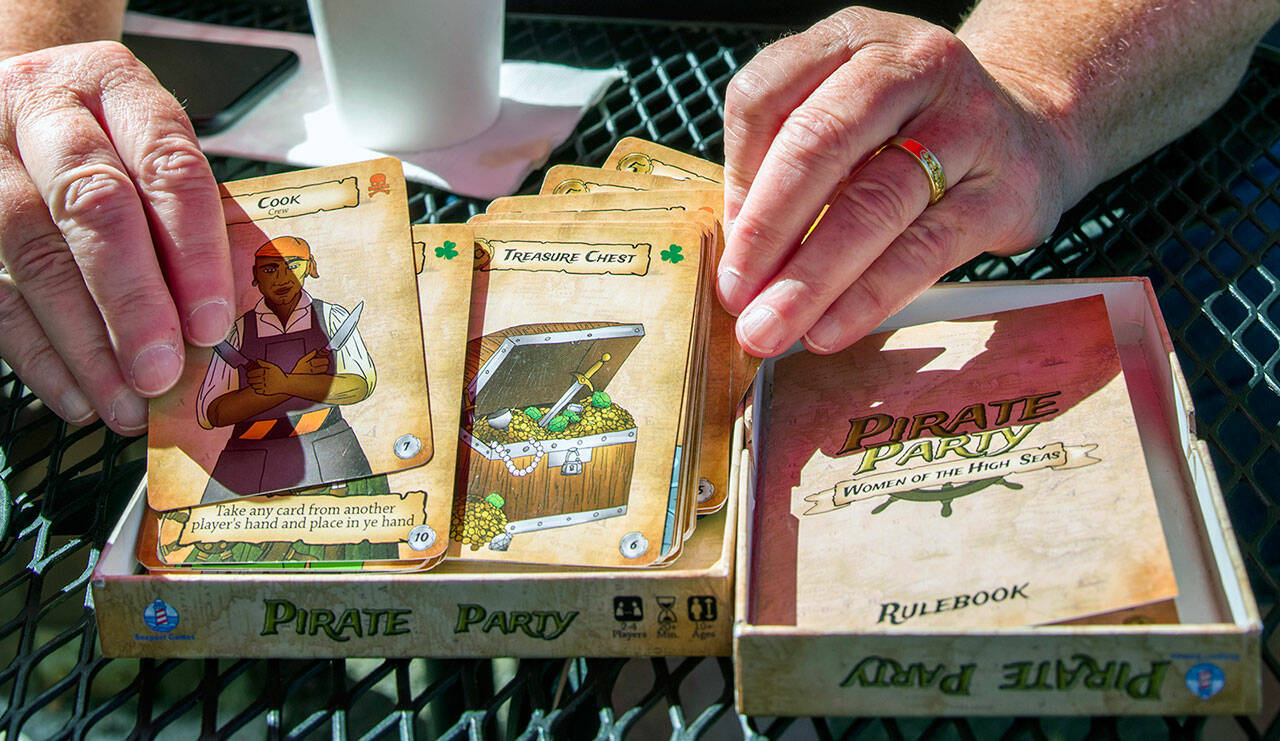PORT ANGELES — Marge Rosen knew in her teens exactly what she wanted to do for a career.
“I knew I wanted to be a musician for the rest of my life,” she said.
Indeed, the Port Angeles resident succeeded in making music her profession — until the COVID-19 pandemic hit the North Olympic Peninsula.
“With COVID, I pretty much lost my entire career,” said Rosen, a conductor, drummer, trumpet player, teacher and veteran.
“I had a lot of time on my hands.”
So Rosen returned to another lifelong passion: tabletop games.
“Since I was a kid, I have customized and experimented with existing games,” Rosen said. “Everything from changing the rules in card games and board games such as Monopoly, to creating new maps for Risk and Terraforming Mars, to creating my own card games and board games.”
Now, with training from local small business incubator Center for Inclusive Entrepreneurship (CIE), Rosen has started her own game business, Seaport Games, and hopes a Kickstarter will catapult her first game, “Pirate Party: Women of the High Seas,” to success.
“I’ve been taking many classes and workshops offered by CIE and Washington Small Business Development Center,” Rosen said.
“My business advisor, Rick Dickinson at CIE, has been instrumental in supporting my efforts in the startup business. What a great resource for the startup business community on the North Olympic Peninsula.”
Pirate Party is a card game for two to four players, ages 10 and older, with 65 different cards, and it’s centered around female pirates from history (see piratepartygame.com). She hired Laura Erwin for the graphic design and illustrations.
“Pirate Party is a great example of utilizing woman creators to create a game that embraces history and diversity,” Erwin said.
“The diversity of the pirate captains is what really interested me in the project,” she added. “I had never heard of many of these captains, and some had very few illustrations of them.
“To truly honor the diversity of these captains, I researched their time period and region to get a better idea of what these captains may have looked like. Most is speculation, but I believe there is a fun in trying to meld modern imagery of pirates with a historical perspective.
“My background in costume design and love of history really shined in this project, leading to a game I think people will love and have never seen before.”
Getting started
At first, Rosen was working on a board game about musical careers, but she realized board games cost more to create and manufacture, so it made better business sense to start with a card game.
Rosen said it’s difficult for game makers to get noticed by big game companies, but developers can get distribution deals if their games sell well independently.
In deciding to start her own company, she thought, “Do I want to spend my time building a company that fits me, rather than me trying to fit a big company?”
Rosen said independent game developers face other challenges. The prototype has to look as professional as the final product, which involves an initial outlay of money. There needs to be extensive testing of the product. Additionally, the costs to produce the game add up, thus necessitating the Kickstarter campaign — a crowdsourcing platform connecting creators who share new work with the communities that will come together to fund them, Rosen explained.
“Backers can contribute as little as $1, just because they believe in the project and want to see it come to life,” she said. “But most people contribute more to get the game as a thank you when the game is manufactured. Backers will be the first to get the game before it is for sale anywhere else.”
On Kickstarter, the creator has a monetary goal, and if it is not reached, they do not receive any money. Rosen is aiming for $4,000.
“All proceeds will go toward manufacturing the game, freight costs from China, Kickstarter and other fees and taxes,” she said.
View the Kickstarter page at tinyurl.com/Pirate HighSeas.
“If the project is fully funded, I will produce at least enough games to reward backers,” Rosen said. “I am hoping to raise enough money to make somewhere between 500 and 2,000 copies of the game, which would truly kick start Seaport Games.”
Rosen said she has been searching for a U.S.-based company to manufacture the game, but costs are so expensive that she would have to charge $35 for the game rather than the $22 if shipped from China, and she doesn’t think people would pay that much for a card game.
She said American companies still have to buy their stock from China, shipping costs continue to rise and all games companies are dealing with the rising costs.
Rosen hopes she can earn enough from Pirate Party to produce her board game, which has the potential to teach players about “different music careers people could have, besides the obvious — everybody wants to be a rock star,” she said.
“But there are so many other jobs. I never knew about that, and I was seeking that as a teenager,” she added. “I thought I had three options: playing in a symphony, you go into the military bands, or being a music teacher. I didn’t see myself as a rock star playing trumpet. I became a music teacher, and I went into the Navy as a musician.”
Rosen said she has plans for the future, beyond her own success, if the company takes off: “My dream would be that I would be providing jobs for my neighbors and for the community, a job for myself making games that people will enjoy.”
________
Emily Matthiessen is a reporter with the Olympic Peninsula News Group, which is composed of Sound Publishing newspapers Peninsula Daily News, Sequim Gazette and Forks Forum. She can be reached at emily.matthiessen@sequimgazette.com.

